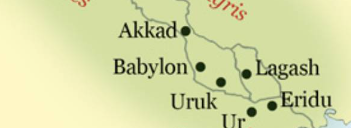Most scholars still think that Abraham came from Ur in southern Mesopotamia / Sumer.
This seems strange for a number of reasons, including:
-The Ur in Mesopotamia is NOT beyond (East of) the Euphrates, although in Joshua 24:3 we read: "I took your father Abraham from beyond the Euphrates River and led him through all the land of Canaan..."
-The specific nomenclature "Ur-kasdim" seems to indicate that an older document was edited after the Chaldeans took control of Ur (sometime after the 9th century BCE). The scribe may have been attempting to make sense of a city name that either no longer existed or that he was not aware of. It's not standard practice to follow the name of a city by the people-group currently ruling over that city... at least I don't know of any other examples in the Hebrew Bible.
-Abram and his wife Sarai clearly came from a different cultural background. If they were from an Akkadian milieu, why do their names not appear to be Akkadian names? And why did they need to change their names to actual Semitic-sounding names? (They didn't adopt Yahwistic names, which is the main reason for name changes in the HB)
May I suggest that Abram (which sounds more Indo-European-ish) was from Urkesh, the capital of the Hurrian region in the Upper Habur from roughly 2300-1800 BCE? (No, I'm not claiming to be the first person to suggest this)
What would be an incredibly long journey from Mesopotamia to Syria is not discussed, even in summary. Instead, immediately after leaving his hometown, Abraham temporarily stays in Haran (Haran is quite close to Urkesh).
Also, his brother's name just happens to be Haran, which may hint at the geographical origin of the family (this sort of explanation for city names is common in Genesis).
What do you think?
By the way, I am not necessarily arguing for the historicity of the figure of Abraham, but am interested in what the original authors of the story meant when they wrote the name of the city he was from
